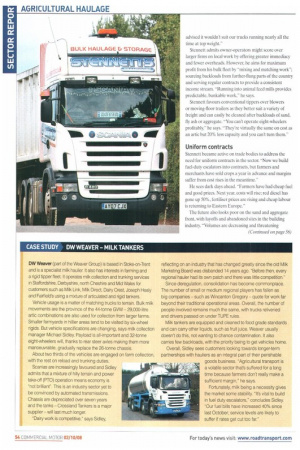CASE STUDY OW WEAVER MILK TANKERS
Page 54

If you've noticed an error in this article please click here to report it so we can fix it.
DW Weaver (part of the Weaver Group) is based in Stoke-on-Trent and is a specialist milk hauler. It also has interests in farming and a rigid tipper fleet. It operates milk collection and Vunking services in Staffordshire, Derbyshire, north Cheshire and Mid Wales for customers such as Milk link, Milk Direct, Dairy Crest, Joseph Healy and Fairfield's using a mixture of articulated and rigid tankers.
Vehicle usage is a matter of matching trucks to terrain. Bulk milk movements are the province of the 44-tonne GNAN 29,000-litre artic combinations are also used for collection from larger farms. Smaller farmyards in hillier areas tend to be visited by six-wheel rigids. But vehicle specifications are changing, says milk collection manager Michael Sidley. Payload is all-important and 32-tonne eight-wheelers will, thanks to rear steer axles making them more manoeuvrable, gradually replace the 26-tonne chassis.
About two thirds of the vehicles are engaged on farm collection, with the rest on reload and trunking duties.
Scan as are increasingly favoured and Sidley admits that a mixture of hilly terrain and power take-off (PTO) operation means economy is "not brilliant". This is an industry sector yet to be convinced by automated transmissions.
Chassis are depreciated over seven years and the tanks Crossland Tankers is a major supplier will last much longer.
"Dairy work is competitive," says Sidley,
reflecting on an industry that has changed greatly since the old Milk Marketing Board was disbanded 14 years ago. "Before then, every regional hauler had its own patch and there was little competition."
Since deregulation, consolidation has become commonplace. The number of small or medium regional players has fallen as big companies such as Wincanton Gregory quote for work far beyond their traditional operational areas. Overall, the number of people involved remains much the same, with trucks reliveried and drivers passed on under TUFF rules.
Milk tankers are equipped and cleaned to food grade standards and can carry other liquids, such as fruit juice. Weaver usually doesn't do this, not wanting to chance contamination. It also carries few backloads, with the priority being to get vehicles home.
Overall, Sidley sees customers looking towards longer-term partnerships with hauliers as an integral part of their perishable goods business. "Agricultural transport is a volatile sector that's suffered for a long time because farmers don't really make a sufficient margin," he says.
Fortunately, milk being a necessity gives the market some stability. "It's vital to build in fuel duty escalators," concludes Sidley. "Our fuel bills have increased 40% since last October; service levels are likely to suffer if rates get cut too far."




































































































































































